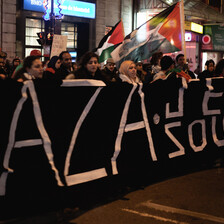The Electronic Intifada 24 March 2008
For the past few years student and academic groups in North America and Europe have been openly campaigning for the boycott of Israeli academia. Some actions produced results (even if not long lasting) and some were unsuccessful. It is important for us working towards the defense of Palestinians’ human rights to learn from these experiences so we may meet our goals in the future. One thing is clear, the stakes are very high and all the major Zionist organizations are responding accordingly.
Let us first look at the boycott campaign in the UK led by the British Committee for Universities in Palestine. The campaign was a well-thought-out initiative, though it was taken on a wild roller coaster ride. The leading organizers worked for over three years educating fellow academics about the case for boycott.
Professors succeeded in getting pro-boycott motions passed by two major academic unions, the Association of University Teachers and the National Association of Teachers in Further and Higher Education. At that time, these two unions were also in the process of merging. The day after the merger, the executive of the new union, the University and College Union (UCU), claimed to have no mandate for a boycott. Pro-boycott professors mounted a new campaign and triumphantly passed a motion for boycott in the first UCU General Assembly. In response, Harvard Law School’s Alan Dershowitz threatened to unleash an army of lawyers ready to file perpetual lawsuits that would “devastate and bankrupt” any union that boycotted Israel. The UCU lawyers balked and eventually the campaign was vetoed by the UCU executive.
One lesson that can be learned is that the campaigns within the academic unions were not coordinated with and tied to a parallel campaign of student mobilization. We cannot know if greater student participation would have made a decisive difference, but generally student activism is less susceptible to financial and institutional pressure. Strikes, walk-outs and shutdowns — as was done in the time of the South African anti-apartheid campaign — might have provided the professors with the added leverage they needed to counter the pressure.
Across the Atlantic in Canada, tens of university provosts and presidents mounted a preemptive strike by issuing statements condemning the UCU boycott. This had a chilling effect on boycott efforts in many universities, although some groups on Canadian campuses have persisted. At McMaster University in Hamilton, Ontario, Solidarity for Palestinian Human Rights (SPHR) condemned their university’s president for signing the letter. The university provost even banned the use of the term “Israeli Apartheid” on campus as a reaction to the continued campaigning. This led to the largest mobilization the campus has seen as hundreds of students and community members flooded McMaster from across southern Ontario. They defied the ban, hanging multiple banners that displayed the term “Israeli Apartheid.” The administration backed down and even denied they had ever issued the ban.
At Queen’s University in Kingston, Ontario, professors, along with the local SPHR chapter, challenged their president for signing a statement. The administration capitulated and financed a discussion on the boycott. Similarly, after the president of Toronto’s Ryerson University issued a statement against the UCU boycott, SPHR along with the Ryerson Student Union (RSU) went on the offensive. Once again the university eventually agreed to organize a panel to debate the boycott.
This affair also extended to the Canadian Federation of Students (CFS), the largest student union in Canada, of which RSU is affiliated. At the CFS annual national meeting, RSU representatives put forward a motion to consider an educational campaign about boycott. The motion was not even allowed on the agenda, and the RSU representatives reportedly walked out. Also when students organized “Israeli Apartheid Week” at Ryerson members of the Jewish Defense League (JDL), the only Jewish group labeled by the FBI as a “right-wing terrorist group,” were at the opening panel harassing attendees. Within weeks, an arson attack targeted the offices of the East African Students Group, one of the groups campaigning for boycott. The police still have not released any information about the culprits.
Though the divide is still wide and the pressure considerable, some students and professors are collaborating on campaigns. Certainly, mass student involvement has been lacking. While the boycott education campaign has just started, it is important to remember most students have had no experience with any campaign of this kind or magnitude. It is one thing to hold a conference or win over one union, but can we hold our gains without having a grassroots education campaign to solidify the ground we stand on? To this date efforts in Canada have been either reactionary or lacking in any long-term strategy.
What is at stake here? We cannot campaign on this issue and lose; that would be a disaster. It is paramount that leading activists, students, and professors develop a strategy to educate our constituencies on the issue before we expose them to the bullying of Zionist lobby groups. One thing people hate more than a bully is a failure.
Laith Marouf is the Chapter Coordinator of Solidarity for Palestinian Human Rights (SPHR), the largest network of students working on Palestinian human rights in North America. He can be reached at laith AT sphr DOT org.
Related Links


